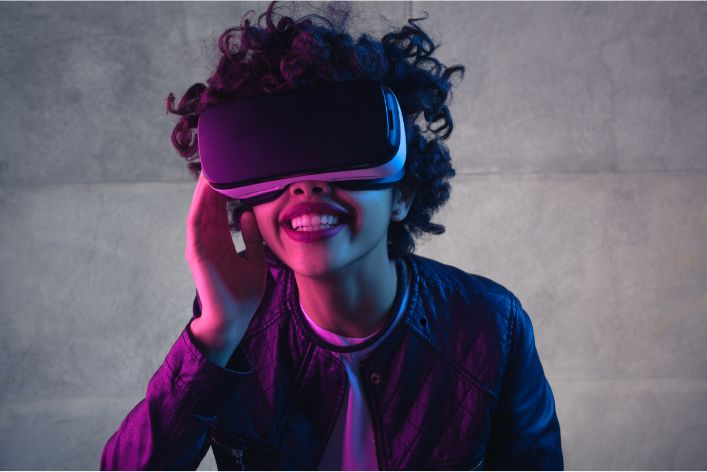Introduction
Technology constantly evolves, shaping the way we connect and interact.
From the invention of the telephone to the rise of social media, our relationships have always adapted.
Now, virtual reality (VR) is revolutionizing love and intimacy.
The Evolution of Virtual Reality
Virtual reality immerses users in a completely digital environment.
With VR headsets, you can explore new worlds, attend virtual events, and interact with others in real-time.
This technology, once a sci-fi dream, has become a part of everyday life.
Key developments in VR include:
- Early Innovations: The 1960s saw the first VR devices, like the Sensorama.
- Modern Advancements: Today’s VR headsets offer high-resolution displays and sophisticated motion tracking.
- Widespread Adoption: VR is now used in gaming, education, healthcare, and social interactions.
VR’s Impact on Relationships
VR’s ability to create immersive experiences makes it a powerful tool for enhancing relationships.
It allows couples to connect in new and exciting ways, breaking down physical barriers and creating shared experiences.
Here’s how VR is changing relationship dynamics:
- Virtual Dating: Couples can go on virtual dates, exploring new places and activities together.
- Long-Distance Love: VR helps long-distance couples feel closer by creating shared virtual spaces.
- Therapeutic Benefits: Relationship counselors use VR to help couples improve communication and resolve conflicts.
Enhancing Love in the Digital Age
In the digital age, VR offers unique opportunities to enhance intimacy and connection.
Couples can use VR to create memories, share adventures, and maintain a sense of closeness, regardless of distance.
Ways VR enhances love include:
- Shared Experiences: Couples can travel, attend concerts, or even cook together in VR.
- Interactive Games: VR games designed for couples provide fun, bonding experiences.
- Virtual Intimacy: VR enables new forms of physical and emotional intimacy.
Virtual reality is not just a technology; it’s a bridge to deeper connections and richer experiences in relationships.
As VR continues to advance, its role in our love lives will undoubtedly grow, bringing us closer together in ways we never imagined.
Embrace VR and explore its potential to enhance your relationships today.
The future of love is virtual, and it’s here now.
Section 1: Understanding Virtual Reality (VR)
Definition of VR
Virtual Reality (VR) immerses users in a computer-generated environment.
Users interact with this digital world using VR headsets and controllers.
These devices track head and hand movements, creating a seamless experience.
VR can simulate real-world or fictional environments, making users feel physically present in the virtual space.
How VR Works
VR systems consist of several components:
- Headsets: Provide visual and auditory input, creating the illusion of being in another world.
- Controllers: Track hand movements, allowing users to interact with virtual objects.
- Sensors: Track physical movements, ensuring the virtual environment responds accurately.
These components work together to create a fully immersive experience.
When you move, the virtual world moves with you.
This synchronization tricks your brain into perceiving the virtual environment as real.
History and Development of VR
The journey of VR technology spans several decades. Let’s explore its key milestones:
- Early Innovations:
- 1960s: Morton Heilig invents the Sensorama, a multi-sensory simulator.
- 1968: Ivan Sutherland and Bob Sproull develop the first VR head-mounted display (HMD).
- 1960s: Morton Heilig invents the Sensorama, a multi-sensory simulator.
- Commercial Attempts:
- 1980s: Jaron Lanier popularizes the term “virtual reality” and founds VPL Research.
- 1990s: Sega and Nintendo release early VR gaming devices, but they fail commercially.
- 1980s: Jaron Lanier popularizes the term “virtual reality” and founds VPL Research.
- Modern Advancements:
- 2010s: Oculus Rift Kickstarter campaign revolutionizes VR, sparking renewed interest.
- Present: Major tech companies like Facebook, Sony, and HTC develop advanced VR systems.
- 2010s: Oculus Rift Kickstarter campaign revolutionizes VR, sparking renewed interest.
Current Applications of VR
Today, VR has found applications in various fields.
Let’s look at some key areas where VR is making an impact:
- Gaming:
- VR creates immersive gaming experiences, allowing players to enter game worlds.
- Popular VR games include Beat Saber, Half-Life: Alyx, and VRChat.
- VR creates immersive gaming experiences, allowing players to enter game worlds.
- Education:
- VR provides interactive learning experiences, making complex subjects easier to understand.
- Students can explore historical sites, conduct virtual science experiments, and practice surgical procedures.
- VR provides interactive learning experiences, making complex subjects easier to understand.
- Healthcare:
- VR aids in medical training, providing realistic simulations for surgeons.
- Therapists use VR for exposure therapy, helping patients confront fears in a controlled environment.
- VR aids in medical training, providing realistic simulations for surgeons.
- Social Interactions:
- VR enables people to connect in virtual spaces, transcending geographical barriers.
- Virtual meetups, conferences, and social events have become popular, especially during the COVID-19 pandemic.
- VR enables people to connect in virtual spaces, transcending geographical barriers.
VR in Gaming
VR gaming immerses players in a fully interactive digital environment.
With VR headsets, players experience the game world as if they are inside it.
They can look around, move, and interact with virtual objects.
This level of immersion enhances gameplay and makes it more engaging.
VR in Education
In education, VR transforms traditional learning methods.
It provides hands-on experiences that enhance understanding and retention.
For example, students can take virtual field trips to historical sites or explore the human body in 3D.
These interactive experiences make learning more engaging and effective.
VR in Healthcare
Healthcare professionals use VR for training and therapy.
Surgeons practice procedures in a risk-free virtual environment.
Put Your Tech Company on the Map!
Get featured on Nicholas Idoko’s Blog for just $50. Showcase your business, boost credibility, and reach a growing audience eager for tech solutions.
Publish NowTherapists use VR to treat phobias, PTSD, and anxiety disorders.
VR’s immersive nature helps patients confront and overcome their fears in a controlled setting.
VR in Social Interactions
VR redefines social interactions by creating virtual spaces for people to connect.
Friends and family can meet in virtual environments, no matter the distance.
VR platforms like AltspaceVR and VRChat host virtual events, from meetups to concerts, fostering social connections in new ways.
Virtual reality has come a long way from its early days.
Its applications in gaming, education, healthcare, and social interactions showcase its versatility.
As technology advances, VR will continue to shape and enhance our experiences in these fields.
Embrace the potential of VR and explore its impact on various aspects of life.
Read: Tech-Enhanced Love: Innovations Shaping Modern Romance

Section 2: The Intersection of VR and Relationships
Virtual Reality (VR) is revolutionizing how we experience and manage relationships.
By creating immersive environments, VR offers new ways to connect and bond.
This section explores how VR transforms dating, supports long-distance relationships, and aids in couples therapy.
Virtual Dating
Virtual dating is changing the landscape of online relationships.
Traditional online dating relies on text and video chats, which can feel impersonal.
VR dating, however, creates immersive, interactive experiences that mimic real-life dates.
Couples can meet in virtual spaces, share activities, and build genuine connections.
Key benefits of VR dating include:
- Immersive First Dates: Couples can explore virtual worlds together, making first dates more memorable and engaging.
- Enhanced Communication: VR environments facilitate more natural interactions, helping couples understand each other better.
- Creative Date Ideas: Virtual reality offers endless possibilities for unique and exciting dates.
Popular VR dating platforms, like VRChat and AltspaceVR, provide virtual spaces where users can meet and interact.
These platforms offer activities such as virtual concerts, movie nights, and adventure games.
By sharing these experiences, couples can form deeper connections and create lasting memories.
Long-Distance Relationships
Long-distance relationships often struggle with physical separation and lack of shared experiences.
VR bridges this gap by creating virtual environments where couples can interact as if they were together.
This technology provides opportunities for intimate moments and shared activities, strengthening emotional bonds.
Ways VR supports long-distance relationships include:
- Shared Virtual Spaces: Couples can meet in virtual homes, parks, or other environments to spend time together.
- Interactive Activities: VR offers shared experiences like cooking, traveling, or playing games, which help maintain intimacy.
- Virtual Reality Dates: Long-distance couples can go on dates in virtual worlds, exploring new places together.
For example, VR apps like vTime XR and Bigscreen allow couples to watch movies, attend events, or simply hang out in virtual spaces.
These shared experiences make long-distance relationships more bearable and enjoyable.
Couples Therapy
VR is also transforming couples therapy, offering new tools for relationship counseling and conflict resolution.
Traditional therapy sessions can sometimes feel intimidating or unproductive.
VR creates a comfortable, immersive environment where couples can work on their issues more effectively.
Benefits of VR in couples therapy include:
- Safe Spaces: VR provides neutral, comfortable environments where couples can discuss their problems without distractions.
- Interactive Exercises: Therapists can use VR to create scenarios that help couples practice communication and problem-solving skills.
- Enhanced Engagement: VR makes therapy sessions more engaging, encouraging couples to participate actively.
Therapists use VR platforms like Oculus Venues and Limbix to conduct sessions in virtual environments.
These tools enable couples to visualize their issues, practice new behaviors, and experience positive interactions in a controlled setting.
Virtual Reality reshapes relationships by enhancing dating, supporting long-distance love, and improving couples therapy.
Embrace VR to transform your relationship dynamics today.
Read: Life with AI: Transforming Daily Tasks Using Modern Tools
Section 3: Enhancing Intimacy and Connection
Virtual Reality (VR) enhances intimacy and connection by creating shared experiences, interactive games, and even enhancing physical intimacy.
This section explores how VR allows couples to connect on deeper levels.
Put Your Tech Company on the Map!
Get featured on Nicholas Idoko’s Blog for just $50. Showcase your business, boost credibility, and reach a growing audience eager for tech solutions.
Publish NowShared Experiences
VR allows couples to share experiences that were once limited by physical constraints.
They can travel together, attend virtual events, or explore new worlds without leaving their homes.
Key shared experiences include:
- Traveling Together: Couples can explore famous landmarks, exotic destinations, or even outer space.
- Attending Events: Virtual concerts, theater shows, and sports events bring couples together in immersive environments.
- Exploring New Worlds: VR offers unique adventures like underwater exploration, space missions, and fantasy realms.
For example, VR platforms like Wander allow couples to explore the world together using Google Street View in VR.
They can visit the Eiffel Tower, walk through Tokyo, or explore the Grand Canyon, all from their living rooms.
This shared experience fosters a sense of adventure and bonding.
Virtual Reality Games for Couples
VR games designed for couples provide interactive and engaging ways to bond and have fun.
These games offer cooperative challenges, creative activities, and competitive fun.
Popular VR games for couples include:
- Keep Talking and Nobody Explodes: One player defuses a bomb with instructions from their partner, encouraging teamwork and communication.
- Rec Room: Couples can play mini-games, paint, or explore virtual worlds together in this social VR platform.
- Acron: Attack of the Squirrels!: One player controls a tree, and others play as squirrels trying to steal acorns, creating a fun and interactive experience.
Playing these games together helps couples improve their teamwork, communication, and problem-solving skills.
VR gaming also provides a playful and enjoyable way to spend time together, strengthening their bond.
Virtual Reality in the Bedroom
VR is also making its way into the bedroom, enhancing physical intimacy and sexual experiences.
Couples can explore new dimensions of their relationship through virtual environments and experiences.
Ways VR enhances intimacy in the bedroom include:
- Virtual Romantic Getaways: Couples can escape to virtual romantic locations, like beach resorts or cozy cabins, to set the mood.
- Interactive Experiences: VR apps offer guided experiences that help couples connect emotionally and physically.
- Erotic Content: VR provides immersive adult content that couples can enjoy together, enhancing their sexual experiences.
For instance, apps like VR Bangers and BaDoinkVR offer immersive adult content designed to enhance couples’ intimacy.
These platforms create realistic environments and scenarios, allowing couples to explore their fantasies safely and privately.
VR offers innovative ways to enhance intimacy and connection in relationships.
By providing shared experiences, interactive games, and enhancing physical intimacy, VR helps couples bond on deeper levels.
Embrace VR to explore new dimensions of your relationship and create lasting memories together.
Read: AI-Driven Dating Apps: Top 10 Revolutionizing Love
Section 4: Challenges and Considerations
While Virtual Reality (VR) offers exciting opportunities to enhance relationships, it also presents challenges and considerations.
These include technical limitations, privacy and security concerns, and emotional implications.
Technical Limitations
Current VR technology still faces several technical limitations that can affect its use in relationships.
These limitations can hinder the overall experience and effectiveness of VR in fostering connections.
Key technical limitations include:
- High Cost: Quality VR systems remain expensive, making them inaccessible to some users.
- Motion Sickness: Some users experience motion sickness or discomfort during VR sessions.
- Limited Mobility: Most VR systems require users to remain in a confined space, limiting natural movement.
- Technical Glitches: VR hardware and software can suffer from glitches, crashes, or connectivity issues.
- Hardware Requirements: High-performance computers or consoles are needed to run advanced VR systems.
For example, users often need powerful computers and expensive headsets like the Oculus Rift or HTC Vive.
These requirements can be a barrier for many couples looking to use VR for enhancing their relationships.
Privacy and Security Concerns
VR interactions raise significant privacy and security concerns.
These issues can impact the safety and trust within a relationship.
Users must remain vigilant to protect their personal information and interactions in virtual spaces.
Major privacy and security concerns include:
- Data Collection: VR platforms collect vast amounts of personal data, including movement patterns and interaction history.
- Hacking Risks: VR systems can be vulnerable to hacking, exposing users to potential breaches of privacy.
- Identity Theft: Personal data shared in VR can be stolen and misused.
- Invasive Advertising: Targeted advertising based on VR usage patterns can intrude on personal experiences.
For instance, companies like Facebook, which owns Oculus, collect user data to improve services and target ads.
This data collection can feel intrusive and raise concerns about how personal information is used and stored.
Emotional Implications
Relying on VR for relationship enhancement can have emotional and psychological effects.
These implications can affect the quality and dynamics of a relationship.
Possible emotional implications include:
- Dependency: Couples may become overly reliant on VR, neglecting real-life interactions and experiences.
- Emotional Disconnect: Virtual experiences might not fully replicate the emotional depth of real-life interactions.
- Escapism: VR can become an escape from addressing real relationship issues, leading to avoidance behavior.
- Unrealistic Expectations: VR can create unrealistic expectations about relationships and intimacy.
For example, couples might prefer virtual experiences over real-life interactions, leading to an emotional disconnect.
This dependency on VR can cause partners to neglect the importance of physical presence and genuine emotional support.
While VR offers innovative ways to enhance relationships, it also presents challenges and considerations.
Technical limitations, privacy and security concerns, and emotional implications are critical factors to address.
Couples should remain aware of these challenges while exploring VR’s potential to strengthen their bonds.
Put Your Tech Company on the Map!
Get featured on Nicholas Idoko’s Blog for just $50. Showcase your business, boost credibility, and reach a growing audience eager for tech solutions.
Publish NowBy understanding and mitigating these issues, they can fully enjoy the benefits of VR in their relationships.
Read: The Benefits and Risks of Virtual Gaming

Section 5: Future Prospects
The future of Virtual Reality (VR) holds exciting possibilities for enhancing relationships.
Emerging technologies and advancements will shape how couples connect, communicate, and interact.
Technological Advancements
Future VR technology promises to further enhance relationship experiences.
These advancements will make VR more accessible, immersive, and interactive.
Potential future developments include:
- Improved Hardware: Lighter, more comfortable headsets will increase user comfort and reduce motion sickness.
- Higher Resolution Displays: Enhanced visual clarity will create more realistic virtual environments.
- Advanced Haptics: Better haptic feedback will simulate touch, adding a new dimension to virtual interactions.
- Wireless Systems: Fully wireless VR systems will allow greater freedom of movement and ease of use.
- Affordable Options: Lower-cost VR devices will make the technology accessible to a broader audience.
For example, future VR headsets might offer retina-resolution displays and advanced haptic gloves, enhancing the sense of presence and touch in virtual interactions.
VR and Human Connection
VR might revolutionize human connections and relationships in the coming years.
It offers unique ways to experience and share moments, creating deeper emotional bonds.
Speculations on future VR impacts include:
- Enhanced Emotional Intimacy: VR could facilitate more meaningful connections by creating immersive shared experiences.
- Global Social Networks: VR may enable people from different parts of the world to form close relationships, transcending geographical barriers.
- Virtual Communities: People might form virtual communities based on shared interests, enhancing social interactions and support networks.
- Remote Relationship Management: VR could help manage long-distance relationships more effectively, reducing the emotional strain of physical separation.
- Customizable Experiences: Couples might create personalized virtual worlds tailored to their preferences and relationship needs.
For instance, VR might allow couples to design their virtual dream homes, creating a unique space for interaction and bonding.
Integration with Other Technologies
The integration of VR with other emerging technologies will further enhance relationship experiences.
AI, AR, and other advancements will complement VR, creating more immersive and personalized interactions.
Key integrations include:
- Artificial Intelligence (AI): AI can create intelligent virtual assistants and companions, enhancing the interactivity of VR experiences.
- Augmented Reality (AR): Combining AR and VR can blur the lines between virtual and real worlds, creating mixed-reality experiences.
- Internet of Things (IoT): IoT devices can integrate with VR to create smart environments that respond to users’ actions.
- 5G Connectivity: Faster internet speeds will enable smoother and more reliable VR experiences.
- Machine Learning: Personalized VR experiences can be created using machine learning algorithms that adapt to users’ preferences.
For example, AI-driven virtual assistants could help couples plan virtual dates, while AR could overlay virtual elements onto real-world environments, enhancing the sense of presence.
The future of VR promises stronger, more connected relationships through technological advancements and deeper human connections.
Embrace VR to explore new dimensions of intimacy and interaction.
Read: Virtual Reality: What it is, does and will be
Conclusion
Summary of Key Points
VR is enhancing relationships in several ways:
- Virtual Dating: Couples enjoy immersive first dates in exciting virtual worlds.
- Long-Distance Relationships: VR bridges distances, offering shared experiences and intimate moments.
- Couples Therapy: VR aids in relationship counseling, providing safe, engaging environments for communication.
Final Thoughts
VR has the potential to transform love and human connections.
It offers innovative ways to bond, communicate, and experience intimacy.
As VR technology advances, it will continue to redefine the dynamics of relationships.
Couples can create new memories and explore deeper connections through immersive experiences.
Call to Action
Explore VR technology in your relationship.
Embrace its potential to enhance intimacy and connection.
Stay informed about future VR developments.
By adopting VR, you can open up new dimensions in your relationship.
Dive into the virtual world and see how it can bring you closer together.
Additional Resources
Links to VR Platforms and Tools:
- VRChat: Connect with others in shared virtual spaces.
- AltspaceVR: Attend virtual events and meetups with your partner.
- vTime XR: Explore virtual worlds together.
- Rec Room: Play interactive games and create memories.
Further Reading:
- The Future of Long-Distance Relationships in a Digital Age
- 10 VR Games & Apps Perfect For Newcomers
- The Reality of Virtual Reality: The Ethical Considerations of VR and AR Technologies [In-Depth Analysis]
Embrace VR to explore new possibilities in your love life.
Discover how technology can bring you closer together and create lasting memories.
Before You Go…
Hey, thank you for reading this blog post to the end. I hope it was helpful. Let me tell you a little bit about Nicholas Idoko Technologies.
We help businesses and companies build an online presence by developing web, mobile, desktop, and blockchain applications.
We also help aspiring software developers and programmers learn the skills they need to have a successful career.
Take your first step to becoming a programming expert by joining our Learn To Code academy today!
Be sure to contact us if you need more information or have any questions! We are readily available.
[E-Books for Sale]
1,500 AI Applications for Next-Level Growth: Unleash the Potential for Wealth and Innovation
Put Your Tech Company on the Map!
Get featured on Nicholas Idoko’s Blog for just $50. Showcase your business, boost credibility, and reach a growing audience eager for tech solutions.
Publish Now$5.38 • 1,500 AI Applications • 228 pages
Are you ready to tap into the power of Artificial Intelligence without the tech jargon and endless guesswork? This definitive e-book unlocks 1,500 real-world AI strategies that can help you.
See All 1,500 AI Applications of this E-Book
750 Lucrative Business Ideas: Your Ultimate Guide to Thriving in the U.S. Market
$49 • 750 Business Ideas • 109 pages
Unlock 750 profitable business ideas to transform your future. Discover the ultimate guide for aspiring entrepreneurs today!
See All 750 Business Ideas of this E-Book
500 Cutting-Edge Tech Startup Ideas for 2024 & 2025: Innovate, Create, Dominate
$19.99 • 500 Tech Startup Ideas • 62 pages
You will get inspired with 500 innovative tech startup ideas for 2024 and 2025, complete with concise descriptions to help you kickstart your entrepreneurial journey in AI, Blockchain, IoT, Fintech, and AR/VR.
We Design & Develop Websites, Android & iOS Apps
Looking to transform your digital presence? We specialize in creating stunning websites and powerful mobile apps for Android and iOS. Let us bring your vision to life with innovative, tailored solutions!
Get Started Today



